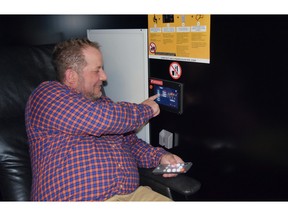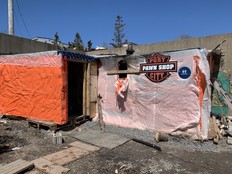Rest cabins a 'distraction' from real problems: nurses
Nurses' union says new rest cabins are not feasible for nurses, takes attention away from retention bonuses

Article content
The president of the New Brunswick Nurses Union says new rest cabins in New Brunswick hospitals are taking attention away from the larger issues of staff retention.
Paula Doucet said in an interview Wednesday she has spoken with union members who expressed their concerns about the 19 Recharjme cabins that are located in health-care facilities across the province.
The cabins were shown to media last week, including the two at the Dr. Georges-L.-Dumont University Hospital Centre. They are small, dark pods with a vibrating and heating zero-gravity chair, a light-therapy lamp and a selection of music or guided meditation.
Horizon Health Network and Vitalité Health Network have touted the cabins as ways of improving the workplace experience.
The project is an extension of the provincial health plan’s “People Pillar” strategy that aims to increase employee satisfaction, reduce absenteeism due to injury and illness, and reduce attrition.
Horizon’s regional director of employee health, wellness and safety, Brittany Stein, told Brunswick News last week that cabins are currently in the pilot phase with staff looking at staff feedback and usage to determine if they will continue using rest cabins and if more should be brought in. Stein had said they had been getting positive feedback so far.
Doucet said nurses are not convinced. Through a recent conversation with members Doucet said the nurses told her staffing shortages on their units would prevent them from resting in the cabins.
“Maybe other health care professionals would have the time to participate in these recharge cabins, but as registered nurses, licensed practical nurses, or NPs [nurse practitioners], they can’t leave their units or their patients to even think about doing that,” she said.
Could this money have been better spent?
Paula Doucet
According to a news release the cabins are available 24 hours a day, but must be booked in 25-minute sessions. Doucet said that is not ideal for nurses because the timing of their breaks is unpredictable depending on staffing, workload, and patients’ needs.
“It might have been nice on paper, but the operationalizing of it is really not meant for nurses,” she said. “Some of them actually felt like this was a bit of a distraction to the real issue which is about retention, and retaining nurses in our system.”
The nurses’ union president said members wanted to know if nurses had been consulted during the planning for the rest cabins, and how much the pods cost.
“Could this money have been better spent on trying to retain the staff within their facilities,” she said. “Sometimes ideas are well intentioned, but if you haven’t really incorporated conversations with the staff that they’re meant for it may not be the best idea to put in place.”
Health Department Sean Hatchard said in an email that 20 recharge rooms will be installed within the regional health authorities and Ambulance New Brunswick, and there are also wellness coordinators implemented for the Department of Social Development, health authorities, and ANB. The funding provided for those projects was $987,000.
On Horizon’s website, there is a list of close to 20 retention initiatives that are underway. A flexible staff scheduling program, employee surveys, wellness hubs, one-year service recognition, and distinction awards have been launched.
Projects in process include continuous conversation technology, pet therapy, staff mentoring, and a leadership development program.
Doucet said the absence of financial retention bonuses is a larger issue than rest cabins. For the past few years, the nurses’ union has lobbied the provincial government asking for financial incentives to retain experienced nurses.
Newfoundland and Labrador, Nova Scotia, and Prince Edward Island have already introduced retention bonuses for its nurses. Last spring, the Nova Scotia government delivered $330 million worth of bonuses for its nurses, paramedics and other health-care professionals as part of a multi-year retention program.
The nurses’ union and the New Brunswick Medical Society were both critical of the province for failing to include retention bonuses in the most recent provincial budget.
When questioned in the legislature last month, Premier Blaine Higgs reiterated his government’s strategy to retain existing health-care workers by focusing on improving working conditions.
Doucet was asked about other retention initiatives that would help nurses to stay in their positions, and she was unable to answer the question because of negotiations with the province for a collective agreement for the Part III bargaining unit of hospital nurses, nurse managers, and supervisors.
According to a Government of New Brunswick document, the collective agreement expired on Dec. 31, 2023.
–With files from Barbara Simpson, Payge Woodard












Postmedia is committed to maintaining a lively but civil forum for discussion. Please keep comments relevant and respectful. Comments may take up to an hour to appear on the site. You will receive an email if there is a reply to your comment, an update to a thread you follow or if a user you follow comments. Visit our Community Guidelines for more information.